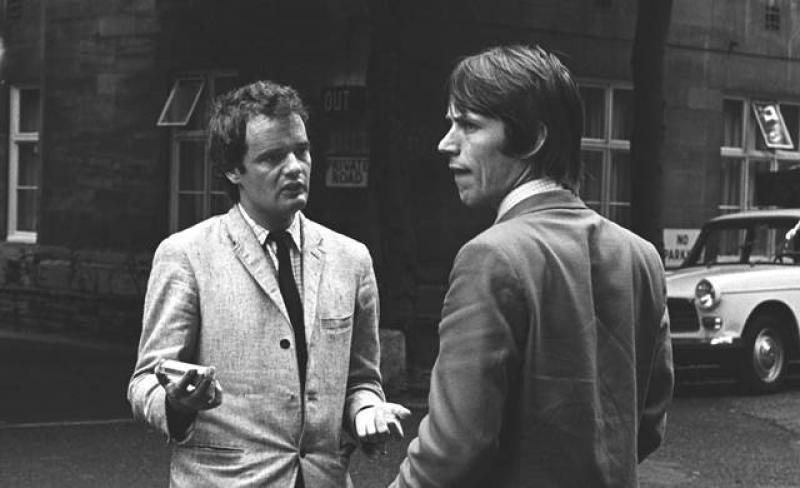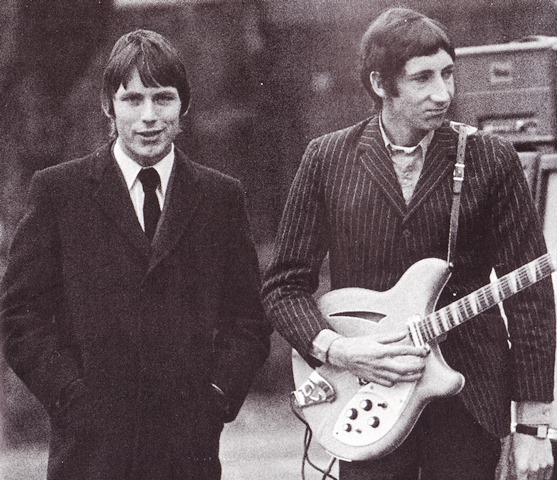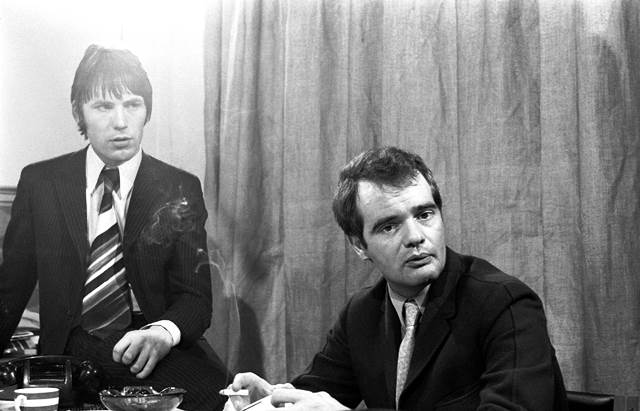Lambert & Stamp | reviews, news & interviews
Lambert & Stamp
Lambert & Stamp
Doc on the managers who steered The Who to world-wide success could be tighter

“I fell in love with both of them immediately,” says Pete Townshend of Kit Lambert and Chris Stamp, the managers who took his band The Who to world-wide success. An hour into Lambert & Stamp, a documentary on the duo, the depth of that bond is belatedly seen in a touching clip of Townshend demonstrating one of his new songs. Singing with acoustic guitar, Townshend tries a tentative run-through of “Glittering Girl”.
Lambert & Stamp charts the pair’s relationship, their discovery of The Who and how they helped guide them to, as the Sixties ended, a position which would see the group as the only real rivals to The Rolling Stones and Led Zeppelin as a global British rock phenomenon. Typically, there are three stages to the story: the rise, the plateau of success, and the inevitable end of the relationship.
 The film is strongest on the early years and its portrayal of the dynamic between Lambert, Stamp and Townshend. The last two appear in specially filmed interviews, but Lambert only features in archive footage (he died in 1981, aged 45). Lambert and Stamp were emblematically Sixties in a particularly British way. Christopher Lambert was posh, spoke posh and dressed posh. As seen strikingly, he spoke fluent French and German. He was the son of composer Constant Lambert, who also died at 45. East London-born and working class, Christopher Stamp – who died in 2012, a fact carelessly unacknowledged in the film – was the brother of actor Terence. Chalk and cheese is the cliché, and it is used. The pair first met while working as assistant directors in film. They hatched the plan to make a nouvelle vague-style film of their own on a pop group. The High Numbers, as The Who were in 1964, became their choice of subject. Smitten by the quartet, they became their managers and ousted the incumbent Who team (no mention is made of this coup). (Pictured right, Chris Stamp with Pete Townshend.)
The film is strongest on the early years and its portrayal of the dynamic between Lambert, Stamp and Townshend. The last two appear in specially filmed interviews, but Lambert only features in archive footage (he died in 1981, aged 45). Lambert and Stamp were emblematically Sixties in a particularly British way. Christopher Lambert was posh, spoke posh and dressed posh. As seen strikingly, he spoke fluent French and German. He was the son of composer Constant Lambert, who also died at 45. East London-born and working class, Christopher Stamp – who died in 2012, a fact carelessly unacknowledged in the film – was the brother of actor Terence. Chalk and cheese is the cliché, and it is used. The pair first met while working as assistant directors in film. They hatched the plan to make a nouvelle vague-style film of their own on a pop group. The High Numbers, as The Who were in 1964, became their choice of subject. Smitten by the quartet, they became their managers and ousted the incumbent Who team (no mention is made of this coup). (Pictured right, Chris Stamp with Pete Townshend.)
Lambert and Stamp are as important to the history of British pop as they were to the history of The Who. They figured out how to market the band, encouraged Townshend’s artistic aspirations and – especially Lambert – created an environment where his muse could flourish. Townshend notes that he now realises he was singled out for special treatment. Singer and frontman Roger Daltrey relates that he slept in the band’s van or on office sofas while Townshend lived in their manager’s Belgravia flat. Lambert was gay, but did not make any overtures to Townshend. The relationship appears to have been limited to the artistic and business.
 The duo did not limit themselves to The Who – they set up Track records, initially to propagate Jimi Hendrix. The story of Lambert’s subsequent decline as result of drink and drugs is tremendously sad. The Who, which included the unruly Keith Moon, are characterised as less out of control than their managers by Stamp himself. After Moon’s death, the band disentangled themselves from the pair.
The duo did not limit themselves to The Who – they set up Track records, initially to propagate Jimi Hendrix. The story of Lambert’s subsequent decline as result of drink and drugs is tremendously sad. The Who, which included the unruly Keith Moon, are characterised as less out of control than their managers by Stamp himself. After Moon’s death, the band disentangled themselves from the pair.
Who watchers will love Lambert & Stamp, while fans of pop and rock in general have much to chew on too with its wealth of extraordinary archive material. But at just short of two hours, Lambert & Stamp is overlong. Too much time is given over to explanation from the contributors: some snippets should not have been allowed through. Of Track, Townshend is seen saying “Kit was the first guy to start an independent label in the world.” There were many, many independent labels beforehand (Townshend ought to know this and the filmmakers should have: one, Planet, was run by former Who producer Shel Talmy). Townshend claims “Ride a White Swan” by T-Rex as a Track release: it was not. Anachronisms irritate. Mod-era footage is soundtracked by recordings from years later, like the Live at Leeds version of “Shakin’ all Over”. Townshend is seen discussing the influence of the composer Purcell, who Lambert had steered him towards, on “The Kids are Alright”, but the song is not heard.
As much about the ethos of The Who and how it evolved as it is about their managers, Lambert & Stamp is essential for anyone with a passing interest in the band and the era in which they were at their prime. But some tightening before its release would have been beneficial.
Overleaf: watch the trailer for Lambert & Stamp
Watch the trailer for Lambert & Stamp
rating
Share this article
Subscribe to theartsdesk.com
Thank you for continuing to read our work on theartsdesk.com. For unlimited access to every article in its entirety, including our archive of more than 15,000 pieces, we're asking for £5 per month or £40 per year. We feel it's a very good deal, and hope you do too.
To take a subscription now simply click here.
And if you're looking for that extra gift for a friend or family member, why not treat them to a theartsdesk.com gift subscription?

Add comment